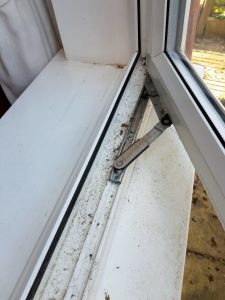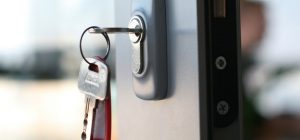It’s that time of year again when the weather starts to do funny things to our doors. I am already being called out to do jobs that could be avoided with some basic maintenance for your locks.
Here on the Norfolk Coast, locks are not only at risk of rusting, but also damage from sea salt and wasps (more on those later).

So what can you do to avoid having to call me, or at least make the call a bit cheaper?
Firstly, keep your door (and window) locks clean. It’s very easy to forget about the front edge of a door when it is shut while you clean, but I see some shocking sights in my work. The more dirt and dust is allowed to build up, the more it finds its way into the working parts of your lock eventually causing damage.

The next step is oiling your locks. There is a lot of argument in the locksmithing world as to whether WD40 or graphite is better. For me, I say WD40 used twice a year (every time you change your locks is an easy way to remember and perfect for changes in weather) works just fine because it coats and flushes at the same time. Oiling does not mean just squirting a bit of oil where you put your key in the lock. If you have a wooden door with a mortice (“Chubb” type) lock, then the part inside stops the oil getting to where is needed and if you have a lock with a “Yale” type key, then oil in the key way is only getting a tiny percentage of what needs to be oiled. If you have any lock with a latch, either pull the handle down or rotate any lever knob to retract that latch. If you look where the latch retracts, you will see that the wedge shape of the latch will create a perfect gap for you to put in the straw provided with cans of WD40. Squirt for about 5 seconds (10 seconds if first time) and then work the handles, etc a few times to get the oil all over the insides.
On doors with multipoint locking systems (eg UPVC doors) you should also look at the front edge and lift the handles up and down a few times. Give another squirt of oil to anything you see moving. When you do this, you might even find the sticker that tells you to oil the door that you never knew was there and the installer never told you about! If you have a wooden door with a single deadlock, unscrew the faceplate at the front and take it off. This will now give you a larger gap around bolt. You might have to hold the WD40 straw in one corner, but squirt what you can, being aware you might get some splash back at you and oil does not clean up from clothes easily, so no maintenance in your wedding dress/designer suits. Don’t forget to put the face plate back on afterwards. In all cases, put some rags on the floor as oil will run down and drip off the bottom of the door and WD40 even stains paving stones.
Once you have done all the above, keep an eye on how difficult your door is to open. Hotter summers are warping even doors that never recognisably warped before. If your door is becoming difficult to operate in any way, there will be undue stress on various parts of your lock which will eventually lead to something breaking. The most common problem last year was French doors shrinking away from each other and the hooks of the multipont mechanisms not being able to get into their slots. Multipoint mechanism doors are usually adjustable, if your door is not as easy to operate when closed as it is open, best get the door adjusted before something breaks and you will have to add a locking product on to the cost of the adjustment.
Finally, those pesky wasps. If you have a wooden door with a multipoint locking system (lift the handles to lock) and it does not have top and bottom bolts, there will be a gap at the top behind the metal faceplate. This gap runs down behind the faceplate as far as the first moving part you can see. It is the perfect size for wasps to make cells in which to grow more baby wasps. Those cells harden a lot and can cause the mechanism to break. My advice is to at least put insect repellent all over the top of the door and then maybe stick a small cotton wool ball just in the top to bar access. I’ve dealt with a few of these cases now, and I really don’t like angry wasps trying to get me while I destroy their hard work!

If you have any questions regarding the above information, please don’t hesitate to get in touch by phone, text or email.
Thanks for reading.
Common key & lock mistakes – And How To Avoid Them

It has been a while since I have produced a blog helping you to avoid needing to call out people like me. So here is a short list of common, avoidable mistakes people make that might just help you not make those same mistakes, hopefully saving you time and money.
Safe Keys
Putting override keys inside your battery operated safe: Safes are great, but if you have a key operated safe, the safe is only as good as the place you hide the key. People are quite obvious in hiding places, so digital safes are a lot better then simple key turn safes. The only problem is that digital safes have master key overrides and the safest place for these keys is in the safe itself. But if you only use your safe rarely there is a good chance you will forget about it, It gets placed in a built in cupboard, covered in clothes and out of sight, out of mind. The batteries start to die and because it is covered in clothes, you don’t hear the warning beep and pretty soon, you have a keypad that you cannot use. Thankfully, you have override keys…. But they are inside the safe. At this point, you can call a domestic locksmith who will gain access by destroying your safe and you will have to pay him for the privilege. You then have to buy a new safe. Potentially £100s because you forgot to change the batteries and left the override keys inside the safe. You can try a safe specialist to come and pick the lock, but the cost might still be £100s because safe specialists are rare (the courses and equipment are expensive) and they don’t get many calls compared to standard locksmiths.
How to avoid disaster? Firstly, take those override keys and trust a family member/good friend to look after them for you. If their house gets broken into and a burglar finds your safe keys, they have no idea what safe they open or where it is. But if they find those keys in your house, they can get into your safe. So, get those keys away from your property. Surprisingly, now your keys are not easily accessible in your safe, you will be more likely to check your batteries! But don’t rely on that. Check how long your safe manufacturer says batteries should last and halve it. Write on the calendar when to change the batteries. Use the old batteries for something else, but keep new batteries in your safe. I love Autumn and Spring because we change our clocks and this gives us a great time to do other things like regular battery changes. Have a list of other maintenance things to do like pre-winter gutter cleaning, etc, and put safe battery changes on that list. This will ensure that if you do have to call someone to open your safe, it will be because something has gone wrong rather than having to explain an expensive memory failure.
Car keys on holiday
I wish I had a sum of money for every time someone called me to say they lost their keys on the beach and the spare car key is 400 miles away on the other side of the country… Oh wait, I do! When you drive somewhere on holiday, take your spare key. When you get to your hotel/air B&B/caravan, etc leave your key somewhere safe at your destination. If you lose your car key, it will be a lot cheaper to get a bus/cab back to your holiday base than it will to call an auto locksmith to come and make a new key on the spot for you. A lot quicker too. Even when you go out on a normal day, if you have someone with you, get them to carry the spare key. If you bring the spare out and leave it in the glove box, you are making life difficult for everyone except car thieves.
Letter boxes
Sticking with cars, most cars are stolen from driveways or outside homes using the keys which have been lifted – either because the front door is left unlocked, or the thief has fished the keys through the letter box. Tools for opening locked doors via the letterbox are getting cheaper, easier to use, and ever more sophisticated. Even if you have an angled guard, there is a tool that goes around it. You might think this is a step back to your Grandma’s house, but a letter basket with closing lid, is a great way to foil the letterbox thief. Better still, seal up the letterbox, and have an external box. If you have room, get one that is big enough for parcels, We get so much delivered these days, a lockable parcel box is a great idea. At the same time, door cams record anyone approaching your door and will have images sent to your phone before they can vandalize it. But I digress..
Copy keys
If you are renting out a holiday home or have multiple carers, etc, get a locksmith to install a new lock, with all new, branded additional keys tried and tested before the lock goes in. Almost every time I get called back to job where the lock has failed, the customer shows me a key that has been copied elsewhere on some poor-quality blank. If you get keys copied and they foul up the lock, that is invalidating any guarantee the locksmith gives you, but if you are using additional keys supplied with the lock at time of installation, you are completely covered. But, if you must get copies made, make sure the original keys are the ones that get used most. I.E. let the guests use them. Yes, they might lose them (less likely if you request a deposit), but if they have poor quality keys and the lock fails and they are locked out waiting for a locksmith who destroys the lock getting in, the cost just multiplies. If you need multiple carers, please get a keysafe. It is better than having to collect keys later and ensures better keys are used.
5 lever locks
Know your terminology; there is a difference between a five lever mortice lock and a multipoint locking system. If you have a wooden door the mortice lock, (often called a ‘Chubb’ lock) is the one that should be 5 levers. If you look at the front plate, It will tell you that it is either 2, 3 5 levers and preferably will display a British Standard kite mark that tells you it has been tested against picking, drilling, sawing and most other forms of attack. If you have a door where you lift the handle and various hooks/bolts/mushrooms, etc. move, this is not a five lever lock. This is a multi-point locking system and your insurance is happy with that, which is bizarre because these systems are only as good as the locking barrel you put your key into and insurance companies are yet to wake up to how easy these can be to bypass. Again, digressing, but please talk to your local locksmith about kite-marked barrels. And if your architect/builder/designer tries to tell you these new multi-point doors without handles are a good idea, ignore them. When there is no handle, all the force of opening the door goes through the key. The leverage ratio is tiny compared doors with nice big handles, and at some point, you will snap your key in your lock.
Complacency
My last one for this blog; Just the other day, I fixed a basic lock on the top half of a stable door. It was not insurance compliant. When I challenged the customer regarding this and told him that his insurance company would not pay out if he were burgled, he replied with one I have heard often: ‘This is Norfolk. Although I know someone in the next village got burgled and lost a lot, it’s highly unlikely I will.’ So why pay for insurance at all? If you are paying for insurance, you owe it to yourself to make sure you are compliant. A second house this week is having three locks replaced after one has stopped working. I pointed out the three locks were all 3 lever and not insurance compliant, so the customer in this case, ordered new locks without delay. If you have an older house, don’t just assume the locks are up to spec. Most decent locksmiths do a free security check and, speaking for myself, when I do security checks I will tell you where advice is necessary and where advice is just personal recommendation.
This article about insurance required locks is quite good.
Should you have any questions regarding the above, please get in touch.
Thanks for reading





